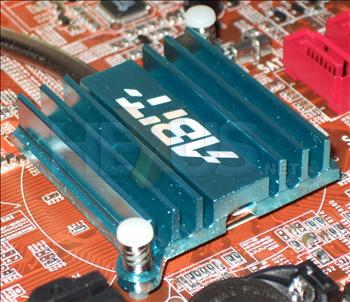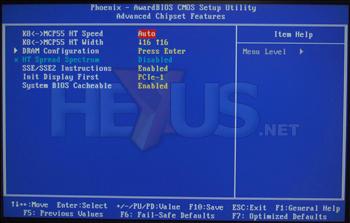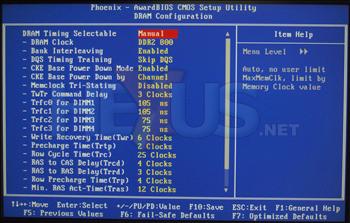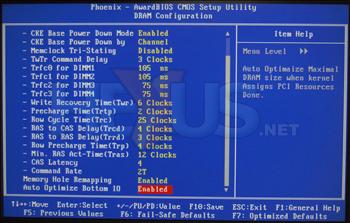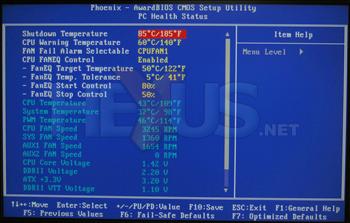Ports and features, BIOS
Ports and features
Time to get involved in some I/O action.
The only 'legacy' attachments here are the PS/2 ports, though they remain quite useful, with this very review being typed out on a keyboard with PS/2 connectivity. Side by side are the two 1Gbps ethernet ports (supporting DualNet) and four USB 2.0 ports. To their left are six audio jacks for the 10 channel audio of the ALC833 audio chip and hidden just to their left is the TosLink optical connection. There's no coaxial audio connection however, so if you want digital connectivity, it's got to be via optical cabling. Further, the ALC833 is missing the almighty 'D' suffix, which would bring with it Dolby Digital Live and DTS encoded 5.1 through a single digital link.
The remaining void allows air to flow out of the case having passed through the Silent OTES heatsink. There's no fan luring it through, though. There's room there for a FireWire connection, yet for some reason abit neglected to use one, opting for just a header on the board near the additional USB headers. On our perusal of the board we found no extra POST diagnostic features either, so it's beeps all round if you run into trouble.
We've already explored, to some degree, by inspection of the board layout, the features supplied by the northbridge, which includes six SATA 3Gbps ports. These are ClickConnect compatible and with the northbridge's nVRAID functionality, can be run in RAID modes 0, 1, 0+1 or 5.
BIOS
In the BIOS of the last nForce 570 SLI based board we examined, we didn't find too many enthusiast features. Things do appear to be better with the abit KN9 SLI though.
The DRAM configuration page is rich in tweakable options.
The PC health page also reports back a comprehensive array of temperatures, fan speeds and voltages, along with offering control shutdown temperatures and fan speeds. This board, however, is bereft of abit's excellent uGuru technology.
For the important clocks and voltages, here's a breakdown of what can be fiddled with.
| Feature | Adjustments possible |
|---|---|
| HT Reference Clock | 200-450MHz (1MHz increments) |
| CPU FID | x4-CPU MAX. FID (x0.5 increments) |
| PCI-E Clock | 100-145MHz (1MHz increments) |
| HT Multiplier (CPU-SPP) | 1-5x (x1 increments) |
| Memory | 400/533/667/800MHz |
| CPU Core voltage | CPU Nominal - 2.100v (0.025v increments) |
| Memory VDIMM | 1.80-2.30v 1.80-2.10v (0.05v increments) 2.10-2.30v (0.10v increments) |
| Memory VTT | -60/-30/+0/+30mv |
| MCP voltage | 1.20-1.40v (0.05v) |
| HT Voltage | 1.20-1.40v (0.05v) |
More tweaks than MSI's K9N SLI Platinum, which at the time of writing is the only other nForce 570 SLI board with which we can compare it against.







